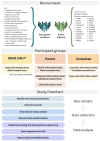European Autism GEnomics Registry (EAGER): protocol for a multicentre cohort study and registry
- PMID: 38834317
- PMCID: PMC11163653
- DOI: 10.1136/bmjopen-2023-080746
European Autism GEnomics Registry (EAGER): protocol for a multicentre cohort study and registry
Abstract
Introduction: Autism is a common neurodevelopmental condition with a complex genetic aetiology that includes contributions from monogenic and polygenic factors. Many autistic people have unmet healthcare needs that could be served by genomics-informed research and clinical trials. The primary aim of the European Autism GEnomics Registry (EAGER) is to establish a registry of participants with a diagnosis of autism or an associated rare genetic condition who have undergone whole-genome sequencing. The registry can facilitate recruitment for future clinical trials and research studies, based on genetic, clinical and phenotypic profiles, as well as participant preferences. The secondary aim of EAGER is to investigate the association between mental and physical health characteristics and participants' genetic profiles.
Methods and analysis: EAGER is a European multisite cohort study and registry and is part of the AIMS-2-TRIALS consortium. EAGER was developed with input from the AIMS-2-TRIALS Autism Representatives and representatives from the rare genetic conditions community. 1500 participants with a diagnosis of autism or an associated rare genetic condition will be recruited at 13 sites across 8 countries. Participants will be given a blood or saliva sample for whole-genome sequencing and answer a series of online questionnaires. Participants may also consent to the study to access pre-existing clinical data. Participants will be added to the EAGER registry and data will be shared externally through established AIMS-2-TRIALS mechanisms.
Ethics and dissemination: To date, EAGER has received full ethical approval for 11 out of the 13 sites in the UK (REC 23/SC/0022), Germany (S-375/2023), Portugal (CE-085/2023), Spain (HCB/2023/0038, PIC-164-22), Sweden (Dnr 2023-06737-01), Ireland (230907) and Italy (CET_62/2023, CEL-IRCCS OASI/24-01-2024/EM01, EM 2024-13/1032 EAGER). Findings will be disseminated via scientific publications and conferences but also beyond to participants and the wider community (eg, the AIMS-2-TRIALS website, stakeholder meetings, newsletters).
Keywords: genetics; mental health; registries.
© Author(s) (or their employer(s)) 2024. Re-use permitted under CC BY. Published by BMJ.
Conflict of interest statement
Competing interests: In the past 3 years, TC has served as a paid consultant to F. Hoffmann-La Roche and Servier and has received royalties from Sage Publications and Guilford Publications. DGMM has received funding for a PhD studentship from Compass, and for consulting from Jaguar Therapeutics and Hoffman Le Roche. GM receives funding for an investigator-initiated study from Compass Pathways; no financial or other conflict of interest with the present study. SB discloses that he has in the last 3 years acted as an author, consultant, or lecturer for Medice, Roche and Linus Biotechnology. SB receives royalties for textbooks and diagnostic tools from Hogrefe, UTB, Ernst Reinhardt, Kohlhammer, and Liber, and is a partner at NeuroSupportSolutions International AB. CC is a full-time employee of Genentech and owns stocks or RSUs in Roche Holdings. MA is the UK chief investigator for a trial sponsored by Roche (a phase II, randomised, double-blind, placebo-controlled, parallel group study to evaluate the safety, efficacy and pharmacodynamics of 52 weeks of treatment with basmasanil in participants aged 2–14 years old with dup15q syndrome followed by a 2-year optional open-label extension). LB served on an advisory board to Kingdom therapeutics in 2022.
Figures
References
Publication types
MeSH terms
LinkOut - more resources
Full Text Sources


